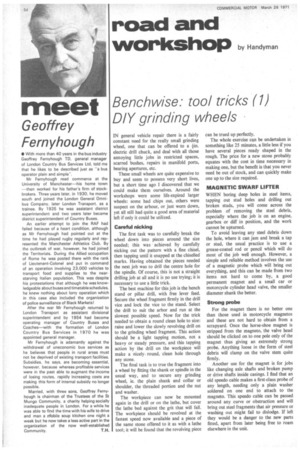meet
Page 56

If you've noticed an error in this article please click here to report it so we can fix it.
Geoffrey Fernyhough
• With more than 40 years in the bus industry Geoffrey Femyhough TO, general manager of London Country Bus Services Ltd. told me that he likes to be described just as "a bus operator plain and simple".
Mr Fernyhough read commerce at the University of Manchester—his home town --then worked for his father's firm of stockbrokers. Three years later, in 1930, he moved south and joined the London General Omnibus Company, later London Transport, as a trainee. By 1935 he was assistant district superintendent and two years later became district superintendent of Country Buses.
An earlier attempt to join the RAF had failed because of a heart condition, although as Mr Fernyhough had pointed out at the time he had played rugby regularly and represented the Manchester Athletics Club. By the outbreak of war, however, he had joined the Territorials. During the Allied occupation of Rome he was posted there with the rank of Lieutenant-Colonel and put in command of an operation involving 23,000 vehicles to transport food and supplies to the nearstarving Italian population. This was despite his protestations that although he was knowledgeable about buses and timetable schedules, he knew nothing about lorry operation which in this case also included the organization of police surveillance of Black Markets!
After the war Mr Fernyhough returned to London Transport as assistant divisional superintendent and by 1954 had become operating manager of Country Buses and Coaches—with the formation of London Country Bus Services in 1970 he was appointed general manager.
Mr Fernyhough is adamantly against the withdrawal of uneconomic bus services as he believes that people in rural areas must not be deprived of existing transport facilities. Subsidies, he says, are becoming essential. however, because whereas profitable services were in the past able to augment the income of losing routes, rapidly increasing costs are making this form of internal subsidy no longer possible.
Married, with three sons, Geoffrey Fernyhough is chairman of the Trustees of the St Mungo Community, a charity helping socially inadequate people in London. For a while he was able to find the time with his wife to drive and man a dobile soup kitchen one night a week but he now takes a less active part in the organization of the now well-established














































































































